Mortgage rates are unpredictable, home purchases are slowing, and the rental marketing is booming. These changes are going to hit hard, especially with more people moving short distances and renters constantly on the move. Moving companies that fail to adapt will be left scrambling to keep up. People need flexible and fast services and your company needs to deliver. MoversTech CRM will show you why adapting to the 2024 housing market and using CRM is necessary.
Managing market changes with CRM solutions
Fewer people are making long-distance moves in 2024. High mortgage rates and the rising cost of homes are forcing many to stay put or move locally. This shift creates a growing demand for short-distance relocations as people choose more affordable options closer to home.

A CRM system helps moving companies respond to this market shift effectively. By automating lead tracking, CRMs allow businesses to quickly capture new opportunities, especially for local moves. Additionally, a CRM keeps communication with potential customers organized and provides essential data through automated reporting. You can get moving company reports to track performance and stay informed about market trends. It’s an essential tool for adapting to the 2024 housing market.
CRMs provide powerful reporting features that help moving companies analyze customer behavior and trends, comparing data with previous seasons. This allows businesses to draw critical conclusions about who is moving, where they are going, and how key demographics are shifting. Understanding these changes helps moving companies stay competitive by refining their services and adjusting their approach to the most desirable areas.
Targeting the growing renter demographic
The number of high-income renters and older adults opting for rental properties over homeownership is on the rise. These renters seek flexibility and convenience, making them a key target for moving companies. This growing demographic demands a personalized approach, and moving companies need to adapt.
As the 2024 housing market shifts, more renters are moving, and each type of renter has unique needs. This is where CRM tools become indispensable. By using CRM to capture leads from multiple sources, you can not only segment them based on renter profiles but also gain insights that shape your approach. It’s like having a roadmap that shows you exactly who your potential clients are, allowing you to craft personalized strategies that resonate with each group.

Once you’ve segmented these leads, you’re empowered to tailor your marketing to their specific preferences. This means creating targeted campaigns that speak directly to their needs—whether it’s flexible scheduling for short-term renters or premium services for luxury renters. By aligning your services with what each profile seeks, you position your company as the perfect solution in a fast-changing market.
Examples of common renter profiles that a CRM can help you target
- Apartment movers: Long-term renters moving from one apartment to another often need larger trucks or flexible dates. CRMs help target them with full-service moving, packing, and unpacking options.
- Short-term renters: Short-term renters need quick, affordable moves. CRMs let you promote time-sensitive services like same-day or next-day moves, plus temporary storage options.
- First-time renters: First-time renters benefit from extra guidance. CRMs enable personalized communication with tips on packing and moving logistics, along with step-by-step guides.
- Corporate relocation renters: Relocating for work often involves coordinating with an employer’s package. CRMs allow you to offer cross-city moves and flexible schedules for these clients.
- Luxury renters: High-end renters expect premium service. CRMs help you market white-glove services, specialty packing, and top-tier customer care to this audience.
CRMs enhance customer service by organizing and streamlining communication
As the moving industry continues to digitize, it’s important to recognize that younger customers expect seamless digital experiences. They prefer to handle moving logistics on their phones, avoid paperwork, and appreciate fast, visually appealing communication. A CRM can facilitate this by providing user-friendly online booking tools, digital quotes, and real-time updates, which makes your company more attractive to the tech-savvy renter demographic.
Enhancing efficiency during market slowdowns
Market slowdowns bring operational challenges for moving companies. Fewer moves and longer booking cycles can create gaps in revenue and inefficiencies in managing resources. A CRM system helps organize operations by automating key processes. It can streamline dispatch, manage crew schedules, and ensure efficient resource allocation, which helps reduce wasted time and labor.

CRMs also provide real-time data that tracks market trends and customer preferences. This data allows you to make informed decisions on pricing, services, and marketing strategies. This ensures you stay competitive even in slower periods.
Based on the insights CRMs provide, you can reassess their pricing and quote systems. Whether customers are moving into apartments, houses, or other living spaces, the system allows businesses to adjust tariffs in real time, ensuring competitiveness. This data-driven approach to pricing guarantees that quotes reflect current market conditions and customer expectations, positioning your company for success.
Building customer trust and loyalty
When people are unsure about moving, they often base their decision on how much they trust the company. Providing exceptional service and keeping customers satisfied should be a top priority. Here are several ways a CRM system can help moving companies build trust with their clients while adapting to the 2024 housing market:
- Personalized service: A CRM allows you to track customer preferences, history, and specific needs. By offering personalized communication and tailored services, you show customers that you value them as individuals, not just another transaction.
- Automated follow-ups: Following up with clients is key to demonstrating reliability and attentiveness. A CRM automates follow-ups, ensuring that no customer inquiry or update is missed, which reassures clients that you’re always on top of things.
- Timely updates: Moving is a stressful process, and customers want to stay informed. A CRM helps you provide timely updates on move status, delivery timelines, and any potential changes, which fosters transparency and trust.
- Efficient feedback management: Gathering and managing feedback is crucial for improving services and resolving customer concerns. A CRM system tracks customer feedback, allowing you to address any issues quickly, showing that you care about their experience.
- Consistent communication: Staying in touch throughout the moving process helps build confidence. CRMs ensure that all communication is consistent, clear, and prompt, which helps reduce any anxieties customers may have.
- Building long-term relationships: A CRM keeps track of past customers, allowing you to send follow-up offers, discounts, or simply check in for future moves. This will make adapting to the 2024 housing market more successful. This ongoing relationship-building fosters loyalty and increaases the likelihood that customers will return and recommend your service.
Preparing for future growth with CRM
Investing in a CRM system is more than just a solution for current challenges—it’s a long-term investment in growth. Besides adapting to the 2024 housing market, you need to prepare for future growth. As the housing market shifts, moving companies need to stay flexible and ready for changes. A CRM enables you to to adapt quickly. With the CRM, you can manage both short-term fluctuations and long-term market trends.
While the current market is marked by slowdowns due to high interest rates, companies should also prepare for future market growth. When interest rates eventually drop, home purchases and long-distance moves are likely to pick up again. A CRM system positions your company to scale quickly and handle these fluctuations efficiently, ensuring you’re ready for increased demand without losing control over operations or quality.
CRM tools also make scaling operations smoother. By using features that help automate moving company finances, provide real-time reporting, and streamline communication, you can expand efficiently while maintaining control and quality. This scalability ensures success, no matter how the market evolves.
Capture new opportunities by adapting to the 2024 housing market
Moving companies must remain agile and responsive to shifting housing market conditions. To stay competitive, you need to adapt to fluctuating demand, target renters, and manage operations during slowdowns. Investing in a CRM system, like MoversTech, is the smartest way to prepare your business. It will make adapting to the 2024 housing market easier. CRMs boost operational efficiency, enhance customer relationships, and attract new opportunities.

